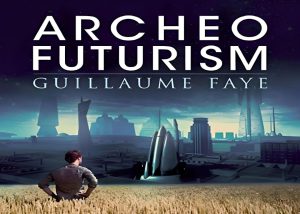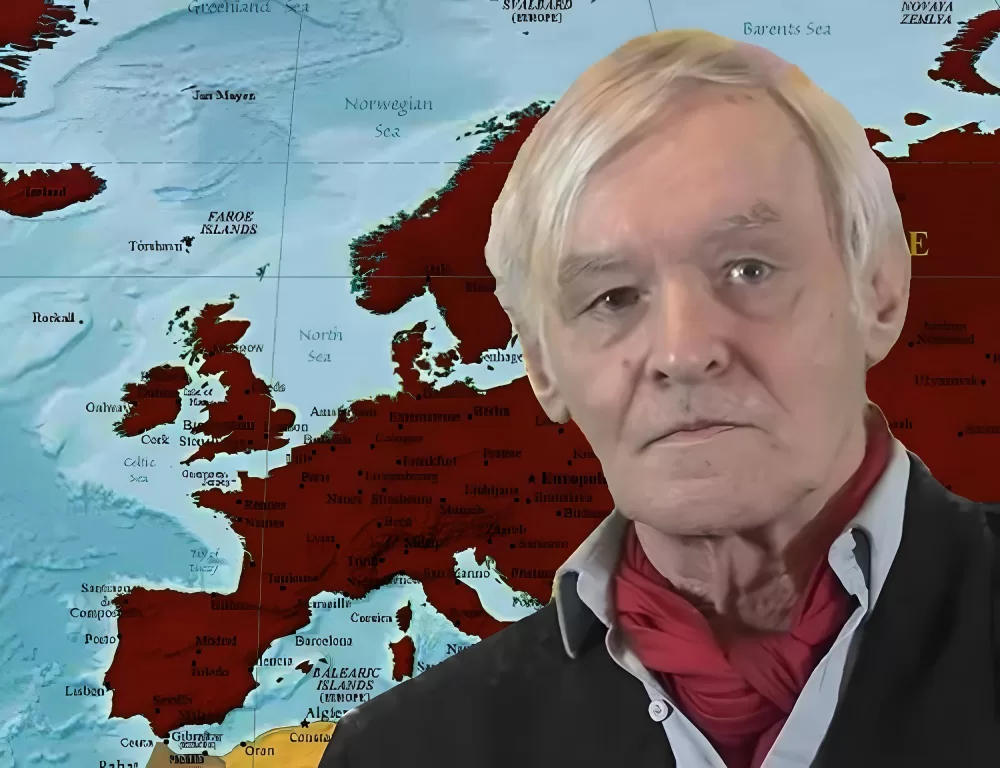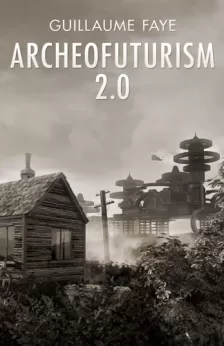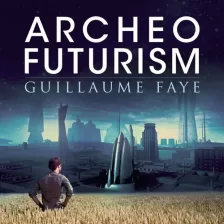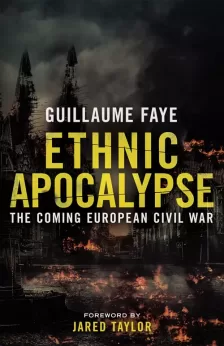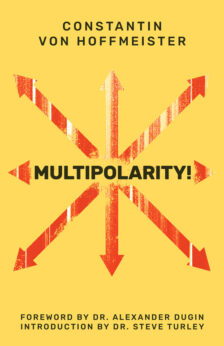Guillaume Faye (1949–2019), with his resplendent intellectual aura, emerges as a cornerstone in the European right-wing intellectual sphere. Born in the historical city of Angoulême in France, his early life bore no overt signs of the intellectual maelstrom that would later define him. As he matured, his academic pursuits led him to study at the prestigious Sciences Po in Paris, where he honed his knowledge of political science.
Faye’s early forays into the world of ideas brought him into the orbit of GRECE (Research and Study Group for European Civilization), a French ethnonationalist think tank. There, he swiftly rose through the ranks, becoming one of its main ideologues in the 1970s and early 1980s. His collaboration with this group enriched his perspectives, allowing him to meld timeless European archetypes with his vision for the future, culminating in the philosophy of Archeofuturism.
Beyond his association with GRECE, Faye had a multifaceted career. He was a journalist, a radio host, and even tried his hand at acting. These varied experiences enriched his understanding of European society and its cultural underpinnings. Yet, amid these ventures, he never strayed far from his intellectual passions, often using these platforms to propagate his ideas.
As his philosophical perspectives matured, so did his articulation of the concept of Archeofuturism, which is wonderfully encapsulated in his magnum opus Archeofuturism: European Visions of the Post-Catastrophic Age. But to truly grasp the depth and breadth of Archeofuturism, one must first explore its foundational tenets.
At its core, Archeofuturism is Faye’s solution to the perceived dichotomy between Europe’s illustrious past and the promise of its future. Far from seeing these as conflicting realms, Faye envisioned a seamless fusion of both. It is a philosophy that beckons Europe to simultaneously draw inspiration from its Greco-Roman, pagan, and medieval legacies while ardently embracing technological and scientific advancements.
Visualize, if you will, the city of Rome in Faye’s Archeofuturistic paradigm: the Colosseum, once a symbol of imperial grandeur, might be transformed into an eco-friendly arena, hosting virtual reality reenactments of historical events. Piazza Navona might showcase sculptures integrated with cutting-edge technology, where Baroque designs are complemented with modern interactive or illuminative elements. Even the Vatican could have its ancient scriptures preserved through non-invasive technologies, allowing scholars from all corners of the world real-time holographic access to manuscripts. In essence, Rome would serve as a living museum, an ode to its past, while being a thriving, tech-forward metropolis.
Faye’s vision was not constrained by geographical or temporal boundaries. Consider the educational institutions of Oxford or Cambridge. In an Archeofuturistic setting, the historic halls would still resonate with the wisdom of the ancestors. Students, however, might use augmented reality to experience Shakespearean plays or utilize AI-driven tools to delve deeper into Platonic dialogues. Imagine a tutorial system enhanced with artificial intelligence, where the pedagogies of Socrates or Aristotle are adapted and personalized for each student, ensuring a blend of classic and contemporary educational techniques.
Beyond the realms of infrastructure and education, Archeofuturism also touches upon societal norms and principles. Faye posited a Europe where time-tested values of community, familial bonds, honor, and chivalry are not seen as archaic, but as vital threads in the organization of society. Here, family dinners could be occasions where grandparents share tales and myths, while holographic displays reenact the scenes. Community festivals could be a mix of celebrating harvest traditions, with drones lighting up the sky, turning the night into a technicolor tapestry.
Furthermore, the European countryside would not be left behind in Faye’s vision. Picture pastoral landscapes of Tuscany or Provence, where traditional vineyards use advanced soil-monitoring systems. Wine-making might see a confluence of age-old techniques with the latest biotechnology to enhance flavors and ensure ecological sustainability. Local fairs could showcase traditional crafts alongside 3D-printed sculptures, appealing to both the nostalgia enthusiasts and the avantgarde art aficionados.
It is also essential to highlight that Archeofuturism is not just a passive composite of two epochs. It is proactive, dynamic, and evolutionary. As Europe grapples with modern challenges — be they ecological, immigrational, or technological — Faye’s philosophy provides a framework to address these issues without discarding the foundational ethos that has defined the continent.
In essence, Archeofuturism, as articulated by Faye, is not a mere retreat into a romanticized past or an unbridled sprint towards a technocratic future. It is a harmonious amalgamation of the old and the new, the past and the future. And as Europe finds itself seeking direction in a rapidly globalizing world, Faye’s vision serves as a lighthouse, illuminating a path that respects traditions while ardently reaching for the horizons of tomorrow. For those who dream of a Europe rooted in its legacy and yet fearless of the future, Faye’s Archeofuturism is not just a philosophy — it is a beacon.
